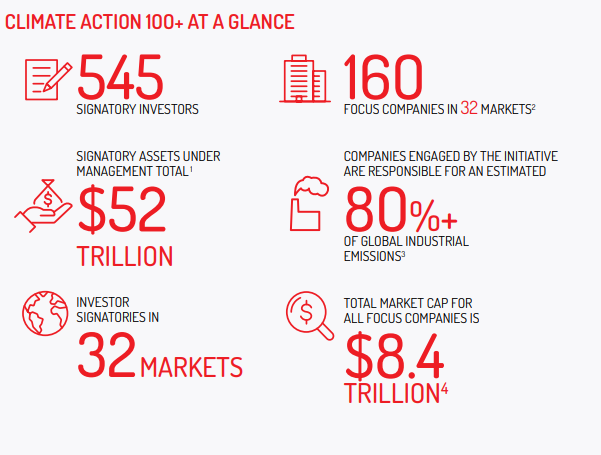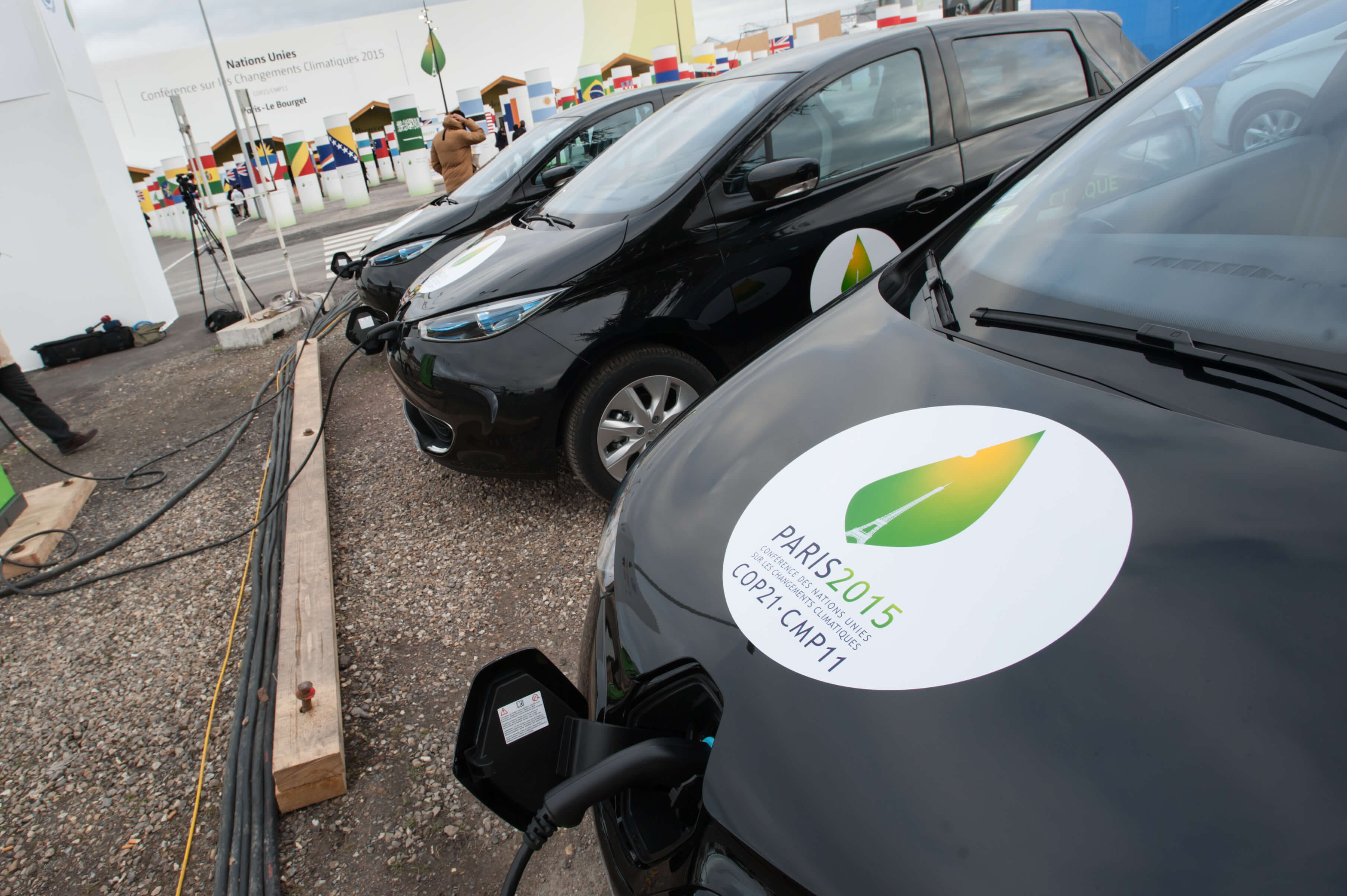In 2015, the private sector joined global leaders and NGOs in Paris to usher in a new era of climate action. But since then, how many companies got serious and made commitments to actually meet the Paris Agreement’s goals? And which companies are on track to achieve them?
Thanks to a new scorecard by investors, we now know that major auto manufacturers are failing to meet essential climate targets.
Climate Action 100+ is a global investor initiative that engages companies on climate action, made up of more than 570 investors who collectively manage over $54 trillion in assets. The initiative recently developed a first-of-its-kind “Net-Zero Company Benchmark” to assess companies’ climate progress across nine key indicators. Last month, Climate Action 100+ released its first assessments of 159 companies around the world, which account for 80 percent of industrial greenhouse gas emissions (GHG).

Photo Credit: Climate Action 100+
None of the companies in the report has a complete plan to produce net-zero emissions by 2050.
The transportation sector accounts for the largest share of GHG emissions in the US and 14 percent of global GHG emissions. The Biden-Harris administration will announce our national commitment for the Paris Agreement this month and we are advocating for a commitment to reduce emissions at least 50% by 2030, including targets that will decarbonize the transportation sector quickly.
Auto manufacturers hold the keys to reducing vehicle emissions. But the Climate Action 100+ report demonstrates that automakers are perpetuating a legacy of polluting vehicles and making weak climate commitments — making it even more challenging to avoid catastrophic climate change.
The Benchmarks
The Climate Action 100+ report evaluates whether a company has set a climate target, and more importantly, whether it is on track to fulfill it.
The automotive section of the assessment focused on 13 companies: BMW, Daimler, Fiat Chrysler, Ford, General Motors, Honda, Nissan, Peugeot, Renault, SAIC, Suzuki, Toyota, Volkswagen, and Volvo. None of the manufacturers have established short-term (up to 2025) or medium-term (2026-2035) commitments aligned with the 1.5°C (2.7°F) goal.
All automakers ranked poorly on the Climate Action 100+ investors’ assessment of their climate policy engagement, which evaluates if the company’s lobbying positions and its trade associations support policies that are aligned with the Paris Agreement goals. Of the 13 companies, only BMW has set a specific commitment to lobby according to the Paris goals. Every auto manufacturer in the assessment has failed to ensure that its trade associations support policies that advance the Paris Agreement goals — something they avoid publicizing as they tout their newfound support for electric vehicles (EVs) .
The Climate Action 100+ investors’ assessment also scores the company's 2021 technology mix against the sector average. For electric vehicles, BMW, Ford, Honda, Nissan, Suzuki, and Toyota are all behind the sector average, and have the most work to do to catch up.
One of the assessment’s key indicators is “Just Transition,” which measures how moving toward a cleaner business model affects a company’s workforce. While it was listed as a key indicator, the investors plan to introduce it in the 2022 assessment. This is a missed opportunity for industry accountability and we should start evaluating companies immediately to ensure they protect their workforce.
Traditional automakers are still primarily recruiting teams that are focused on building fossil-fuel powered vehicles. As they shift toward producing electric vehicles, auto companies must also shift their recruitment strategy. This will take time and require a concerted effort to create new jobs and invest in transition programs. To ensure automakers follow through, investors should be tracking and publicizing automakers’ progress on creating new, family-sustaining jobs in electric vehicle manufacturing.
Auto companies have known the importance of reducing carbon emissions for decades. They have not only refused to adapt but have also financially supported climate denial. After siding with the Trump administration on the rollback of clean car standards, automakers are now making headlines with their EV aspirations. But behind the scenes, the industry’s trade association, Alliance for Automotive Innovation, is lobbying the Biden administration for weaker fuel efficiency and greenhouse gas standards. The empty promises and flip-flopping must end—we need bold climate action now.
Our Recommendations
The Sierra Club’s 2019 Rev Up EVs report showed that automakers were stuck in reverse and remained committed to a business model centered on selling internal combustion engine vehicles. It urged automakers to produce electric vehicles and make it easier for consumers to purchase cleaner cars.
Again, we urge each of the manufacturers included in the Climate Action 100+ report to:
-
Set ambitious targets to reduce emissions and limit global warming to 1.5°C.
-
Produce more electric vehicles models that are accessible and affordable.
-
Ensure that dealerships offer electric vehicle inventory nationwide. Currently manufacturers prioritize the states that have adopted the clean car standards, which requires making electric vehicles available to consumers.
-
Create new EV manufacturing jobs with strong worker protections. No one should be left behind as we transition to pollution-free vehicles.
-
Support stronger vehicle standards. Clean car standards mean healthier communities and a healthier workforce.
-
Invest in consumer education and compelling advertising campaigns for electric vehicles.
The 2020s will be a climate reckoning. The action we take this decade to reduce climate and air pollution will save lives and transform the status quo. Automakers have perpetuated a legacy of vehicle pollution and fought to weaken federal and state vehicle standards and policies. Auto companies must break this vicious cycle and respond to the crisis at our doorstep.
Climate Action 100+’s report shows we must continue to push automakers to set ambitious climate targets, accelerate EV production, and prepare their workforce to produce EVs. We hope to see significant improvement in the 2022 benchmark assessment and will be tracking their progress along the way.
